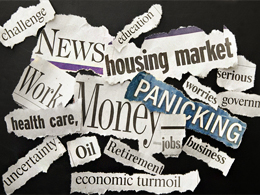 It’s been an interesting couple of weeks, to say the least.
It’s been an interesting couple of weeks, to say the least.
In the words of Lenin, someone I don’t normally quote, “There are decades where nothing happens, and there are weeks where decades happen.” These past few weeks have seen a great deal of change around the world.
Looking at the big picture, the real takeaway here is just how little market reaction there’s been to some very real turbulence—from uncertainty over Greece to technical problems on the New York Stock Exchange.
Another Greek debt crisis
In 2011, the last time Greece found itself on the brink of default, markets panicked. There was a real fear that the world would move back into the crisis of 2008 and that all of the hard-won recovery would vanish. It almost did, at least in Europe, and the shock waves rocked markets and slowed growth around the world.
This time, the markets didn’t panic. We saw a relatively small, very rational reaction in world markets, but the U.S. and even the European economies continued to grow. The bond markets, typically the most sensitive to such events, largely yawned. This is what normal looks like, even in the middle of what would have been, four years ago, a systemic crisis. Now, the system isn't nearly as vulnerable.
A Chinese stock market crash
While the latest round of the Greek crisis was playing out, the Chinese stock market was crashing. Yes, the government has since managed to cap the losses, but we didn’t know that at the time. Think about it: one of the largest economies in the world, with already slowing growth, sees its market plunge. What would this have meant in 2011?
In 2015, it didn’t mean much. Lackluster Chinese growth and market declines were all taken in stride, even as Greece and Europe continued to generate apocalyptic headlines.
Puerto Rico’s debt announcement
The news out of Puerto Rico is another great example of something that, in the past, could have derailed the markets. Several years ago, Wall Street analyst Meredith Whitney blew up the municipal securities marketplace by commenting, off the cuff, that there would be large losses. Now, when the governor of an actual borrower announces that it cannot pay on tens of billions in debt, the market shrugs.
A NYSE shutdown
When technical problems last shut down the Nasdaq, there was a tone of panic in the markets and the media. Now, after the recent halt on the New York Stock Exchange, the media pointed out that trading shifted seamlessly to other venues, no damage done.
Real problems, but not the end of the world
It’s not that these issues aren’t serious; they are. And it’s not that the markets are ignoring them; there were reactions. It’s just that the global financial system is widely believed to be stable enough to recover.
Although major problems continue to appear, the system has moved back to the center, where it should be. Even big events shouldn’t shake it too far out of the comfort zone. The only way to test that, of course, is to see how the system reacts when big events happen.
If we can ride out a major financial crisis, a major stock market crash, a major debt default, and a shutdown of the largest market in the world—all in a couple of weeks—it will take something pretty darn big to cause systemic trouble. And that, my friends, is a very comforting thought.


 Print
Print


